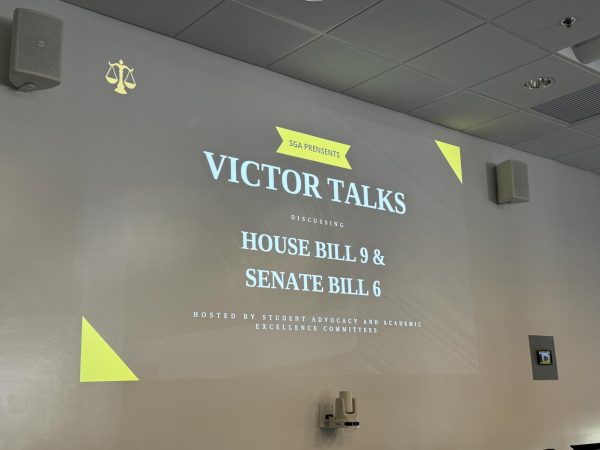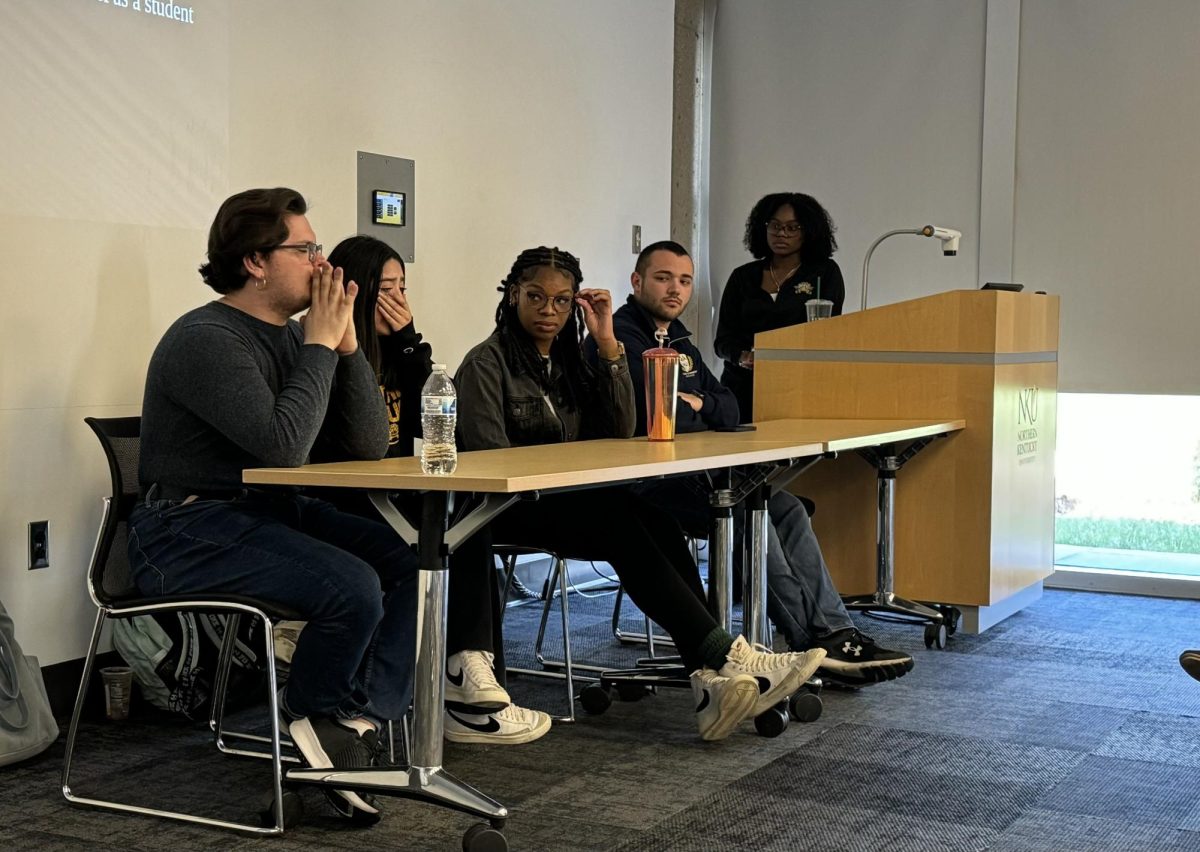The future of diversity, equity and inclusion (DEI) initiatives is still in limbo for Kentucky universities.
NKU student panelists, professors and an administrator led the discussion about Kentucky legislation that seeks to dismantle DEI across the state on Wednesday afternoon. The Student Government Association (SGA) hosted the event which they call “Victor Talks,” which seeks to inform community members on prominent NKU topics.
Where do the bills stand?
Senate Bill 6 and House Bill 9 were presented in the Kentucky legislature earlier this year. The Senate’s version of the bill was filed first, and it would prohibit public university students, staff or faculty from endorsing “discriminatory concepts,” such as political or social ideologies like privilege or discomfort based on one’s race or sex.
The House Bill was more broad, seeking to dismantle DEI offices, mandatory training and restricting characteristics like religion, race, sex, color or national origin from being a factor in a student’s admission or scholarship eligibility.
Only SB 6 has progressed through the legislative process, said Vice President for University Advancement Eric Gentry. HB 9 has never had a hearing or been discussed in committee—a process that is mandatory for the bill to advance at all.
Explaining the legislative process, Gentry said that SB 6 passed in the Senate Education Committee then went to the Senate floor for a vote. After passing a vote in the Kentucky Senate, the bill headed to the House of Representatives for approval. After a couple weeks, there was a special committee meeting called to discuss the bill.
Following this special meeting, the Senate Bill was altered. “What they basically did was take some version—not the exact version–of House Bill 9…and they attached it as an amendment,” Gentry said.

Gentry mentioned that he had read through both the original House Bill 9 and the version that was attached to the Senate Bill and said he couldn’t quite spot the differences. “So they attached House Bill 9 to Senate Bill 6 in the committee,” Gentry said.
This updated bill passed the House after testimony and discussion.
Now, Gentry explained, this updated version has gone back to the Senate for their approval. Three things can happen from here, Gentry said. The Senate can concur, confer or do nothing. Concurring would mean the legislative group agrees with the changes and wants to progress the bill; conferring means they would form a conference committee to discuss the differences and potentially make changes.
Gentry said while he can’t speculate, he expects the Senate to confer and meet about the changes, since it was such a high-priority piece of legislation.
Ultimately, if the Senate passes the bill in any way, it will then go to Governor Andy Beshear for his passage or veto. If Beshear vetoes the bill, the legislature can still override his veto, which is possible since there is a Republican majority in both chambers, Gentry said.
What could change at NKU?
Student questions about if diversity scholarships will be taken away if the bill is passed were met with indirection. “That’s a good question, I don’t know,” responded Gentry. The vice president explained that none of NKU’s practices have had to change as a result of prior rulings, but no definite answer could be given as of Wednesday.
In regards to NKU’s plan, Gentry said things were fluid and constantly changing with new updates. No matter what, the vice president said, student success and student belonging would remain at the core of the university.
Anti-DEI legislation is not just an NKU or Kentucky issue, but a national issue, said Dr. Danielle McDonald, associate dean of the College of Arts and Sciences.
McDonald presented the four pillars of the legislation to the attendees on Wednesday and broke down what changes could occur, and how NKU is already working around such changes.
When it comes to doing away with DEI offices, McDonald pointed out that the focus will be on the administrators, like Chief Diversity, Equity, Inclusion Officer Dr. Darryl Peal. Kentucky state representatives have made it clear they aren’t dismantling offices like NKU’s Center for Student Inclusiveness, McDonald said. Instead, there would be an expectation that Peal spend 50% of his time working with students who are pell-grant eligible.
22% of students at NKU are pell-grant eligible, McDonald said. “I would be surprised if [Peal] is not already working with all 22% of them,” she said.
Another pillar of the legislation is ending training and hiring based on DEI. McDonald pointed out that writing diversity statements when looking for a job is essentially a mandatory process these days, and this won’t be going anywhere.
The fourth topic regards ending the presentation of discriminatory concepts as truth. Again, the associate dean said that NKU professors are likely already implementing this.
“Nobody’s teaching discriminatory concepts, they’re teaching about privilege and how it impacts people. And then you have a conversation about it, and then you come to your own conclusion on what you believe about privilege,” McDonald said. “I don’t stand up in front of the classes and say, ‘This is the truth.’”
Black Studies professor Dr. Eric Jackson added to the conversation, encouraging the students to just keep going and to not let any legislative verbiage slow them down. “At the end of the day, at least for me as a person of color, the struggle is continuous, so you just kind of do what you do regardless of what the landscape is,” Jackson said.
McDonald stressed that even if the legislation is not passed during this session, it is likely to come around again next year.
“This is a long-term fight. This isn’t the end of it, it’s the beginning,” McDonald said.


